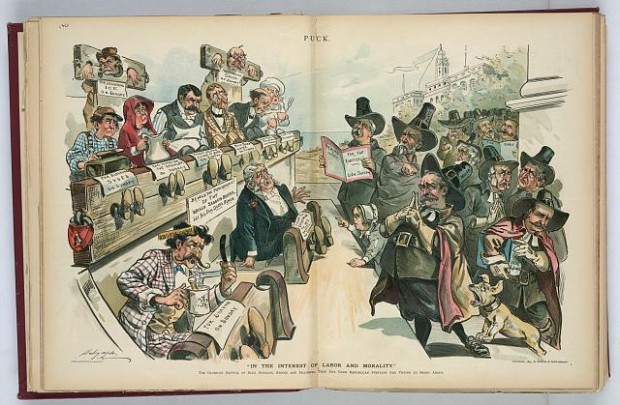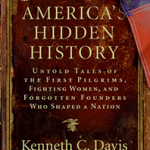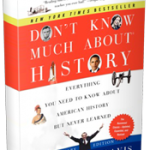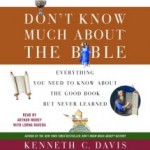
“In the interest of labor and morality” (1895: Image Courtesy of Library of Congress Prints and Photographs Division Washington, D.C. 20540 USA http://hdl.loc.gov/loc.pnp/pp.print)
(12.17.2024 revision of a post first published 12.11.2o13. But it never gets old.)
Fortunately, the so-called “War on Christmas” seems to have disappeared.
Proclaiming a secular assault on the religious significance of the holiday has been a seasonal tradition, just like the Macy’s Parade with Santa Claus. Claiming that “Happy Holidays” or “Season’s Greetings” instead of “Merry Christmas” was a betrayal of Christian America became a staple of conservative talk show hosts and part of America’s political culture wars.
The basic premise: Christmas is under attack by Grinchy atheists and secular humanists who want to remove any vestige of Christianity from the public space. Any criticism of public displays devoted to religious symbols –mangers, crosses, stars — was seen by these folks as part of a wider attack on “Christian values” in America. Mass market retailers who substituted “Happy Holidays” for “Merry Christmas” were part of the conspiracy to “ruin Christmas.”
But in fact, most religious displays are not banned in America. Courts simply direct that one religion cannot be favored over another under the Constitutional protections of the First Amendment. Christmas displays are generally permitted as long as menorahs, Kwanzaa displays, and other seasonal symbols are also allowed.
In other words, the “War on Christmas” is pretty much a phony war. But where did this all start?
The first laws against Christmas celebrations and festivities in America came during the 1600s –from the same wonderful folks who brought you the Salem Witch Trials — the Puritans. (By the way, H.L. Mencken once defined Puritanism as the fear that “somewhere someone may be happy.”)
“For preventing disorders, arising in several places within this jurisdiction by reason of some still observing such festivals as were superstitiously kept in other communities, to the great dishonor of God and offense of others: it is therefore ordered by this court and the authority thereof that whosoever shall be found observing any such day as Christmas or the like, either by forbearing of labor, feasting, or any other way, upon any such account as aforesaid, every such person so offending shall pay for every such offence five shilling as a fine to the county.”
–From the records of the General Court,
Massachusetts Bay Colony
May 11, 1659
The Founding Fathers of the Massachusetts Bay Colony were not a festive bunch. To them, Christmas was a debauched, wasteful festival that threatened their core religious beliefs. They understood that most of the trappings of Christmas –like holly and mistletoe– were vestiges of ancient pagan rituals. More importantly, they thought Christmas — the mass of Christ– was too “popish,” by which they meant Roman Catholic. These are the people who banned Catholic priests from Boston under penalty of death.
This sensibility actually began over the way in which Christmas was celebrated in England. Oliver Cromwell, a strict Puritan who took over England in 1645, believed it was his mission to cleanse the country of the sort of seasonal moral decay that Protestant writer Philip Stubbes described in the 1500s:
‘More mischief is that time committed than in all the year besides … What dicing and carding, what eating and drinking, what banqueting and feasting is then used … to the great dishonour of God and the impoverishing of the realm.’
In 1643, Parliament banned Christmas celebrations.
“The Puritans sought to turn Christmas into a fast day, with an act of Parliament in 1643 declaring that it should be observed ‘with the more solemn humiliation because it may call to remembrance our sins, and the sins of our forefathers who have turned this Feast, pretending the memory of Christ, into an extreme forgetfulness of him, by giving liberty to carnal and sensual delights.’ Two years later, the Directory of Public Worship was unequivocal that feasts such as Christmas had no warrant in scripture.”
–Bruce Gordon, “The Grinch That Didn’t Steal Christmas”
Attending mass was forbidden. Under Cromwell’s Commonwealth, mince pies, holly and other popular customs fell victim to the Puritan mission to remove all merrymaking during the Christmas period. To Puritans, the celebration of the Lord’s birth should be day of fasting and prayer.
In England, the Puritan War on Christmas lasted until 1660. In Massachusetts, the ban remained in place until 1687.
So if the conservative broadcasters and religious folk really want a traditional, American Christian Christmas, the solution is simple — don’t have any fun.
My latest work, The World in Books (Scribner, 2024) includes an entry on the gospel of Luke, which commences with one version of the Nativity. The history behind Christmas is also told in Don’t Know Much About® The Bible.

And read my article on religion in America, “America’s True History of Religious Tolerance” (Smithsonian)
Read more about the Puritans in Don’t Know Much About® History and America’s Hidden History.

America’s Hidden History, includes tales of “Forgotten Founders”

Don’t Know Much About History (Revised, Expanded and Updated Edition)
